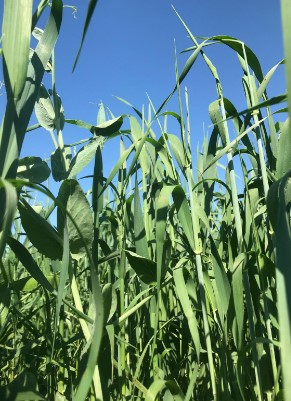By Sara Bauder
As a challenging row crop planting season finally wraps up for 2019 in South Dakota, many producers are looking to plant cover crops on unplanted acres to provide forage, control weeds, reduce erosion, and improve soil health. One popular cool-season grass cover crop is oats. Most oats in South Dakota are grown as certified varieties and it is important to be aware of the legal ramifications behind purchasing oat seed for use as a cover crop.

The South Dakota Crop Improvement Association (SDCIA) focuses on the “delivery of research through the release of public crop varieties”; this includes support of the SDSU small grain breeding programs. Specifically, the South Dakota State University (SDSU) Oat Breeding Program has released many successful commercially available varieties over the last several years including: Goliath, Hayden, Horsepower, Shelby 427, and Natty. In order to continue the development of locally adapted varieties of oats and other small grains for years to come, royalties must be associated with variety releases. Royalties provide funding for equipment, research, and land usage/rental.
When a variety is released from SDSU through the SDCIA, it is protected by ‘Plant Variety Protection with Title V’ (PVP). This requires that the variety be sold as seed by the official variety name as a class of certified seed. Put simply, this means it is not legally permissible for private farmers or elevators/coops to sell protected varieties as grain for seeding purposes (including cover crops) unless said variety was grown or purchased as a protected, named variety. Therefore, farmers cannot sell ‘bin-run’ (SDSU bred) oats to one another legally, as this is technically grain, not a protected, named seed variety. However, it is legally permissible for a grower to plant their own bin-run grain as seed as long as it was grown on their farm.
In addition to following PVP regulations, purchasing quality seed is an important part of protecting South Dakota growers from the introduction of new weed and pest issues. When purchasing any seed it is important to check seed tags for weed seed levels; this is especially true when working with cover crops. Growers should always check to be sure seed has been cleaned and tested for weed seed, disease, and inert matter. Palmer amaranth is a simple example of this, as it has been inadvertently introduced into South Dakota by producers purchasing and growing low quality seed.
As of late, variety infringement has been more readily enforced in South Dakota in an effort to protect both seed integrity and funding for SDSU breeding programs. Recently a ‘Plant Variety Protection’ case was settled in Iowa for $2.975 million; this lawsuit involved SDSU oat varieties that were being illegally sold as part of a cover crop mixture. This information is being provided as a protection tool for South Dakota growers and businesses, as many may be unaware of regulations surrounding the buying and selling of oats in South Dakota. South Dakota grown seed is a great asset to our agricultural sector, and royalties from the sale of protected varieties are a vital part of keeping our breeding programs alive.
Source: sdsu.edu